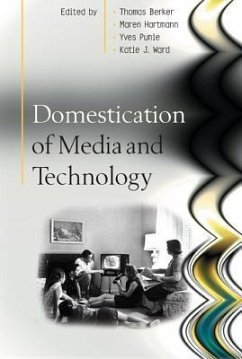This book provides an overview of a key concept in media and technology studies: domestication. Theories around domestication shed light upon the process in which a technology changes its status from outrageous novelty to an aspect of everyday life which is taken for granted. The contributors collect past, current and future applications of the concept of domestication, critically reflect on its theoretical legacy, and offer comments about further development. The first part of Domestication of Media and Technology provides an overview of the conceptual development and theory of domestication. In the second part of the book, contributors look at a diverse range of empirical studies that use the domestication approach to examine the dynamics between users and technologies. These studies include: Mobile information and communications techologies (ICTs) and the transformation of the relationship between private and the public spheres Home-based internet use: the two-way dynamic between the household and its social environment Disadvantaged women in Europe undertaking introductory internet courses Urban middle-class families in China who embrace ICTs and view them as instruments of upward mobility and symbols of success The book offers valuable insights for both experienced researchers and students looking for an introduction to the concept of domestication. Contributors: Maria Bakardjieva, University of Calgary; Thomas Berker, Norwegian University of Science and Technology; Leslie Haddon, Essex University; Maren Hartmann, University of Erfurt; Deirdre Hynes, Dublin City University; Sun Sun Lim, National University of Singapore; Anna Maria Russo Lemor, University of Colorado at Boulder; David Morley, Goldsmiths College, University of London; Jo Pierson, TNO-STB, Delft, Netherlands; Yves Punie, Institute for Prospective Technological Studies (IPTS) in Seville; Els Rommes, Nijmegen University; Roger Silverstone, London School of Economics and Political Science; Knut H. Sørensen, Norwegian University of Science and Technology; Katie J. Ward, University of Sheffield.








